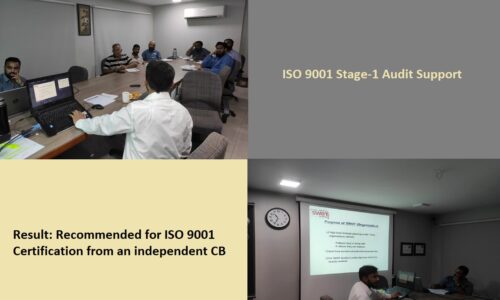In the session conducted by Exoexcellence Consultants with the Hopes Diagnostics lab, the role of leadership in ISO 9001 implementation have been discussed. The session was conducted on a partnership proposal from Hopes Lab that they need to implement standards. In this regard, they were in communication with Exoexcellence Consultants for a long time.

Within the session, the consultant emphasized that leadership plays a crucial role in the successful implementation of any quality management system, including ISO 9001. Here are some key aspects of leadership’s role in ISO 9001 implementation:
- Commitment and Support: Leadership must show a firm commitment to quality and actively support the implementation process. This involves allocating necessary resources, setting objectives, and communicating the importance of ISO 9001 to the entire organization.
- Policy and Planning: Leaders should be involved in developing the quality policy and quality objectives aligned with the organization’s strategic direction. They need to ensure that quality objectives are measurable, communicated throughout the organization, and regularly reviewed for effectiveness.
- Accountability: Leaders should establish clear roles, responsibilities, and authorities for quality management. This includes appointing a management representative who acts as the liaison between top management and employees responsible for implementing the ISO 9001 requirements.
- Communication and Engagement: Leadership should promote effective communication at all levels of the organization regarding the ISO 9001 implementation. They should engage employees, encourage their involvement, and create a culture of quality awareness and continuous improvement.
- Review and Improvement: Leaders conduct management reviews to evaluate the performance of the quality management system, identify areas for improvement, and make strategic decisions based on the review outcomes.
The consultant also explains the difference between ISO 15189 and ISO 9001. While both standards are related to quality management, they have different scopes and target different industries:
- ISO 9001: This is a generic quality management system standard applicable to any organization, regardless of its industry or sector. It provides a framework for establishing and maintaining a quality management system that focuses on meeting customer requirements, enhancing customer satisfaction, and continuously improving processes.
- ISO 15189: This standard specifically addresses the requirements for quality and competence in medical laboratories. It ensures the accuracy, reliability, and quality of medical laboratory testing, and promotes confidence in laboratory results. ISO 15189 incorporates the general principles of ISO 9001, but includes additional specific requirements for medical laboratories.
Finally, Exoexcellence Consultants emphasized the need for legal compliance during the ISO 9001 implementation process. During the session, it was revealed that Hopes Lab is not registered with the Sindh Healthcare Commission; and it is a legal requirement, one participant from Hopes said. Therefore, Mr. Waqas Imam from Exoexcellence Consultants emphasized the ISO 9001 requirement for legal compliance to enroll with the Sindh Healthcare Commission and comply with their regulations. Compliance with applicable laws and regulations is an essential aspect of ISO 9001 implementation. Organizations need to identify relevant legal requirements, ensure their processes align with those requirements, and show compliance during audits and assessments. Here, the Sindh Healthcare Commission likely has regulations and requirements that the Hopes Diagnostics lab needs to adhere to as part of their ISO 9001 implementation. The Hopes top management reassure that they will work towards the compliance of legal requirement and then they will move towards certification.



